Burt A. The Evolution of the British Empire and Commonwealth From the American Revolution
Подождите немного. Документ загружается.

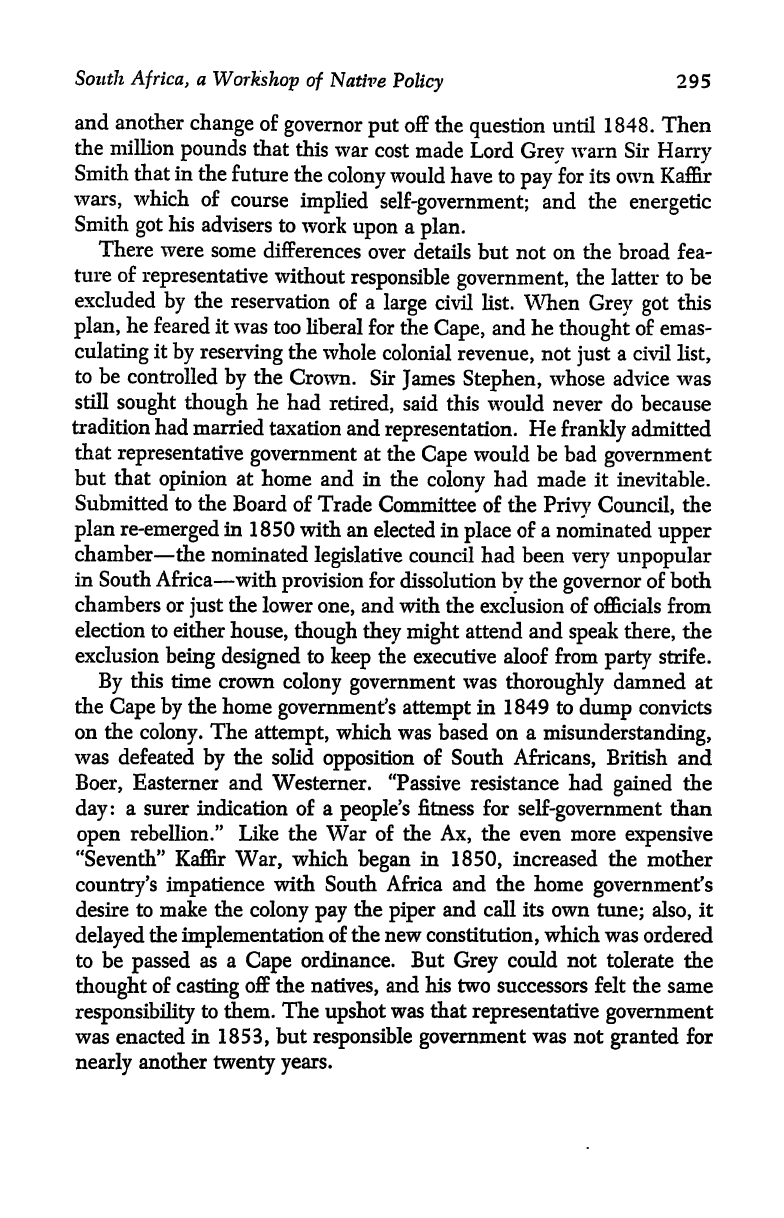
South
Africa,
a
Workshop
of
'Native
Policy
295
and another
change
of
governor
put
off the
question
until 1848.
Then
the
million
pounds
that
this war
cost
made
Lord
Grey
warn Sir
Harry
Smith
that
in
the
future
the
colony
would have
to
pay
for
its
own
Kaffir
wars,
which
of
course
implied
self-government;
and
the
energetic
Smith
got
his
advisers to
work
upon
a
plan.
There
were
some
differences
over
details
but not on the broad
fea-
ture
of
representative
without
responsible
government,
the latter to be
excluded
by
the
reservation
of a
large
civil list. When
Grey
got
this
plan,
he
feared it
was
too
liberal
for the
Cape,
and
he
thought
of
emas-
culating
it
by
reserving
the
whole
colonial
revenue,
not
just
a civil
list,
to
be
controlled
by
the
Crown.
Sir
James
Stephen,
whose advice was
still
sought
though
he
had
retired,
said this
would never do because
tradition
had married
taxation
and
representation.
He
frankly
admitted
that
representative
government
at
the
Cape
would be bad
government
but
that
opinion
at
home
and in
the
colony
had made
it
inevitable.
Submitted
to the
Board
of
Trade
Committee of the
Privy
Council,
the
plan
re-emerged
in
1850
with
an
elected
in
place
of
a
nominated
upper
chamber
the
nominated
legislative
council
had
been
very unpopular
in
South
Africa
with
provision
for
dissolution
by
the
governor
of both
chambers
or
just
the
lower
one,
and with
the exclusion of
officials from
election
to either
house,
though they
might
attend and
speak
there,
the
exclusion
being
designed
to
keep
the
executive aloof from
party
strife.
By
this time
crown
colony
government
was
thoroughly
damned at
the
Cape by
the home
government's
attempt
in 1849 to
dump
convicts
on the
colony.
The
attempt,
which was
based
on a
misunderstanding,
was defeated
by
the
solid
opposition
of South
Africans,
British
and
Boer,
Easterner
and
Westerner.
"Passive resistance had
gained
the
day:
a surer indication
of
a
people's
fitness
for
self-government
than
open
rebellion." Like
the
War of
the
Ax,
the even more
expensive
"Seventh"
Kaffir
War,
which
began
in
1850,
increased the mother
country's impatience
with
South
Africa and
the
home
government's
desire
to
make the
colony
pay
the
piper
and call its own
tune; also,
it
delayed
the
implementation
of
the new
constitution,
which
was
ordered
to
be
passed
as
a
Cape
ordinance.
But
Grey
could not
tolerate
the
thought
of
casting
off the
natives,
and his two successors
felt the
same
responsibility
to them.
The
upshot
was that
representative
government
was enacted
in
1853,
but
responsible government
was not
granted
for
nearly
another
twenty years.
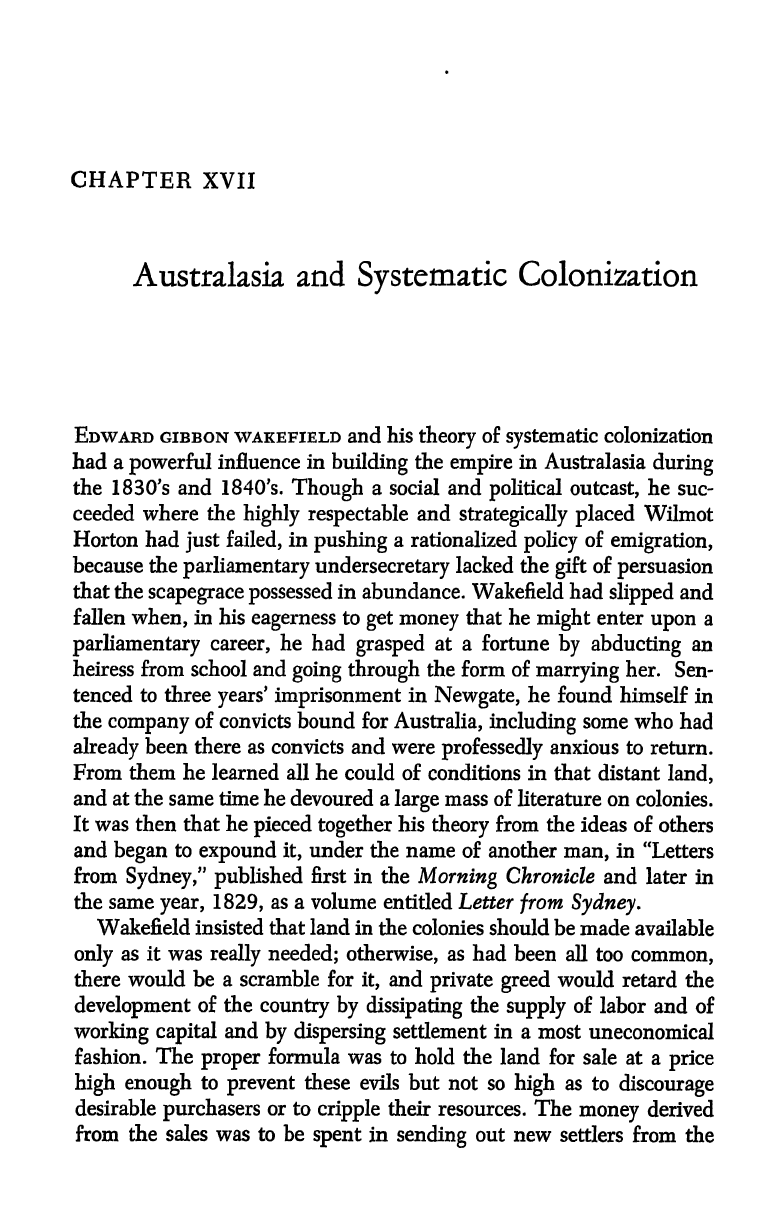
CHAPTER
XVII
Australasia
and
Systematic
Colonization
EDWARD GIBBON
WAKEFIELD
and
his
theory
of
systematic
colonization
had
a
powerful
influence
in
building
the
empire
in
Australasia
during
the
1830's and
1840's.
Though
a social and
political
outcast,
he
suc-
ceeded
where
the
highly
respectable
and
strategically placed
Wilmot
Horton had
just
failed,
in
pushing
a rationalized
policy
of
emigration,
because the
parliamentary undersecretary
lacked
the
gift
of
persuasion
that the
scapegrace
possessed
in
abundance. Wakefield had
slipped
and
fallen
when,
in his
eagerness
to
get
money
that he
might
enter
upon
a
parliamentary
career,
he
had
grasped
at
a fortune
by
abducting
an
heiress
from school and
going through
the form of
marrying
her.
Sen-
tenced
to three
years'
imprisonment
in
Newgate,
he
found
himself
in
the
company
of
convicts
bound for
Australia,
including
some who
had
already
been there
as
convicts
and
were
professedly
anxious
to
return.
From
them he learned
all
he
could
of
conditions
in
that distant
land,
and at
the
same time
he
devoured
a
large
mass of
literature
on
colonies.
It
was
then
that
he
pieced
together
his
theory
from
the ideas of
others
and
began
to
expound
it,
under the name
of
another
man,
in
"Letters
from
Sydney,"
published
first
in the
Morning
Chronicle
and later
in
the same
year,
1829,
as
a volume
entitled
Letter
from
Sydney.
Wakefield
insisted that land in
the
colonies
should be
made
available
only
as
it
was
really
needed;
otherwise,
as
had been
all
too
common,
there
would be
a
scramble for
it,
and
private
greed
would retard
the
development
of
the
country
by
dissipating
the
supply
of
labor
and
of
working
capital
and
by
dispersing
settlement in
a most
uneconomical
fashion.
The
proper
formula
was
to hold
the
land
for
sale
at
a
price
high enough
to
prevent
these
evils but
not so
high
as
to
discourage
desirable
purchasers
or
to
cripple
their
resources. The
money
derived
from
the
sales
was to
be
spent
in
sending
out
new
settlers
from
the
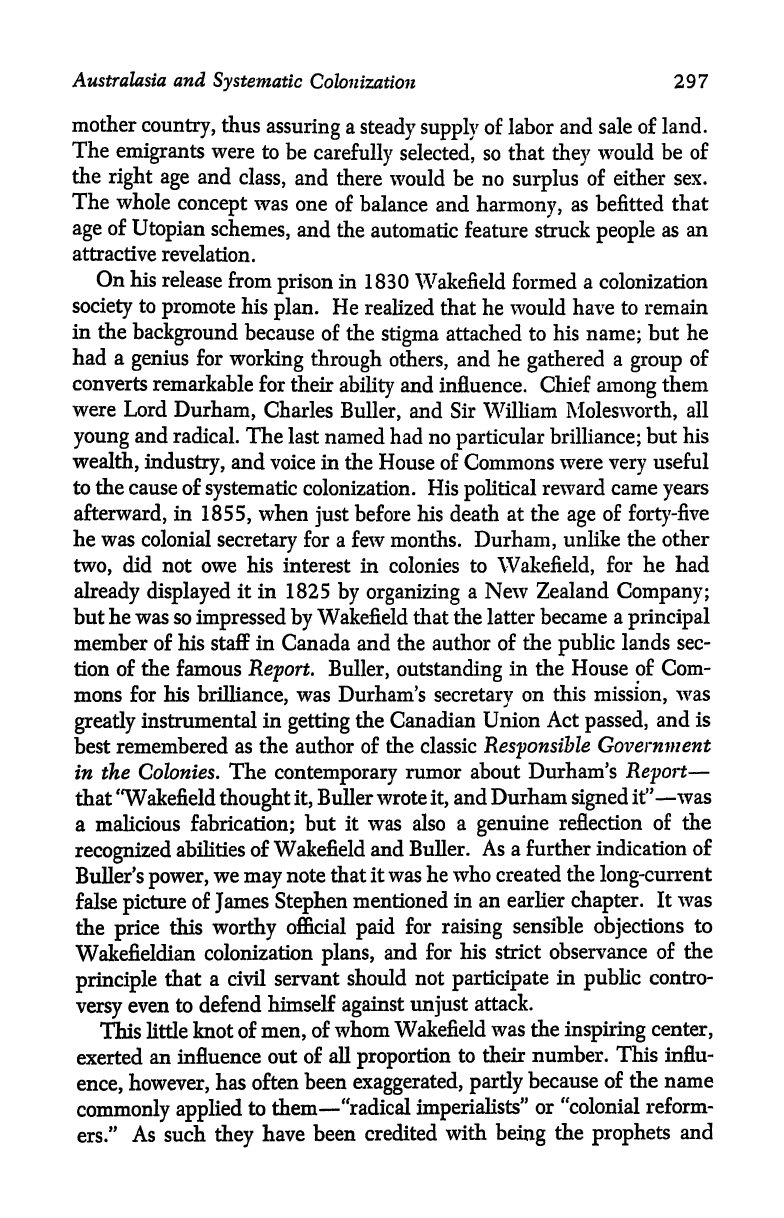
Australasia
and
Systematic
Colonization
297
mother
country,
thus
assuring
a
steady
supply
of labor
and sale of
land.
The
emigrants
were
to
be
carefully
selected,
so
that
they
would
be
of
the
right
age
and
class,
and
there
would
be no
surplus
of either sex.
The
whole
concept
was
one
of
balance
and
harmony,
as befitted
that
age
of
Utopian
schemes,
and the
automatic
feature struck
people
as
an
attractive
revelation.
On his
release
from
prison
in
1830
Wakefield
formed
a
colonization
society
to
promote
his
plan.
He
realized that he would
have
to remain
in the
background
because
of
the
stigma
attached to his
name;
but
he
had
a
genius
for
working
through
others,
and he
gathered
a
group
of
converts
remarkable
for their
ability
and
influence. Chief
among
them
were
Lord
Durham,
Charles
Buller,
and
Sir
William
Molesworth,
all
young
and
radical. The
last
named had no
particular
brilliance;
but
his
wealth,
industry,
and voice in the
House
of
Commons
were
very
useful
to the
cause of
systematic
colonization. His
political
reward
came
years
afterward,
in
1855,
when
just
before
his
death
at the
age
of
forty-five
he was
colonial
secretary
for
a
few
months.
Durham,
unlike
the other
two,
did
not owe his
interest
in colonies
to
Wakefield,
for he had
already displayed
it
in 1825
by
organizing
a
New
Zealand
Company;
but
he was
so
impressed
by
Wakefield that
the latter became
a
principal
member of his staff
in
Canada and the author of
the
public
lands
sec-
tion of the famous
Report.
Buller,
outstanding
in the
House of Com-
mons
for his
brilliance,
was Durham's
secretary
on
this
mission,
was
greatly
instrumental
in
getting
the Canadian Union
Act
passed,
and is
best
remembered
as the author of the classic
Responsible
Government
in the Colonies.
The
contemporary
rumor
about
Durham's
Report
that "Wakefield
thought
it,
Buller
wrote
it,
and Durham
signed
it"
was
a
malicious
fabrication;
but
it was also
a
genuine
reflection of the
recognized
abilities
of Wakefield
and Buller.
As a further
indication
of
Buller's
power,
we
may
note
that it was
he
who created
the
long-current
false
picture
of
James
Stephen
mentioned
in an
earlier
chapter.
It
was
the
price
this
worthy
official
paid
for
raising
sensible
objections
to
Wakefieldian
colonization
plans,
and for
his
strict observance
of the
principle
that
a civil servant
should
not
participate
in
public
contro-
versy
even
to defend
himself
against
unjust
attack.
ITbds little
knot of
men,
of
whom Wakefield
was
the
inspiring
center,
exerted
an
influence
out of
all
proportion
to
their number.
This
influ-
ence,
however,
has often
been
exaggerated,
partly
because of
the name
commonly
applied
to
them
"radical
imperialists"
or
"colonial
reform-
ers."
As such
they
have
been
credited
with
being
the
prophets
and
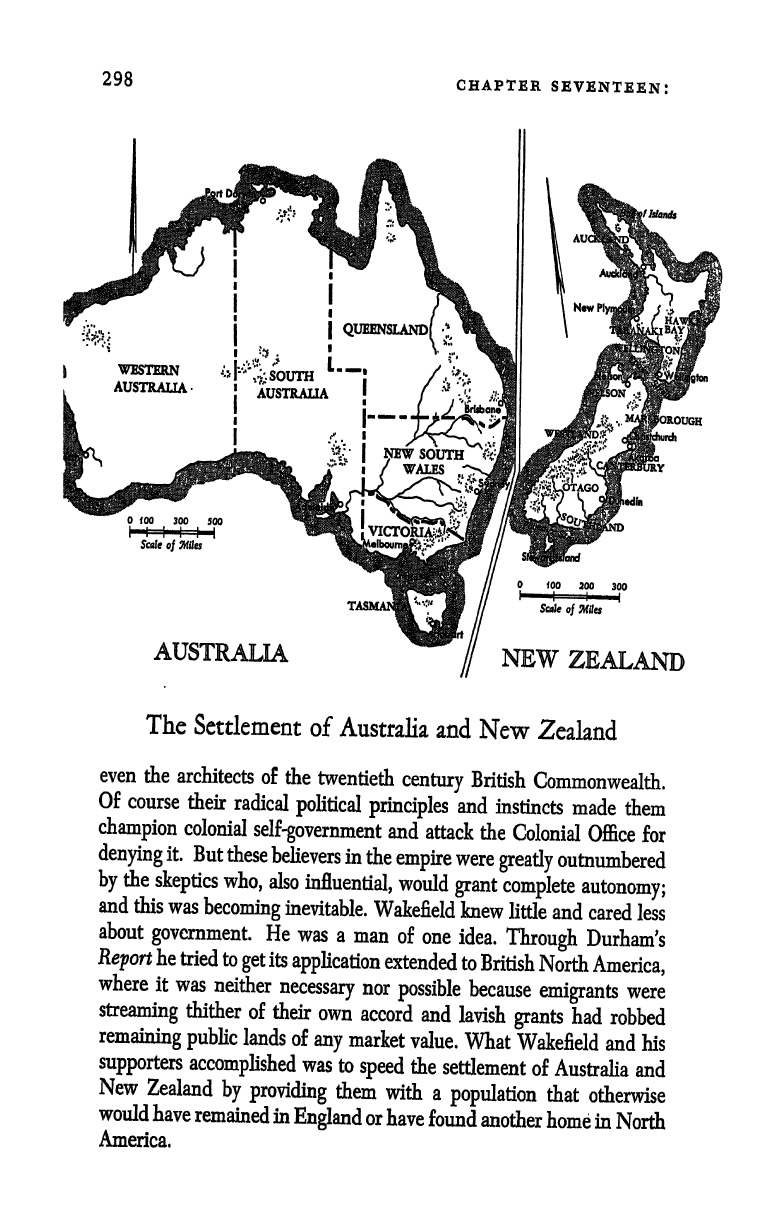
298
CHAPTER
SEVENTEEN:
AUSTRALIA
NEW
ZEALAND
The
Settlement
of
Australia
and
New
Zealand
even
the
architects
of
the
twentieth
century
British
Commonwealth.
Of
course
their
radical
political
principles
and
instincts
made
them
champion
colonial
self-government
and
attack
the
Colonial
Office
for
denying
it.
But
these
believers
in
the
empire
were
greatly
outnumbered
by
the
skeptics
who,
also
influential,
would
grant
complete
autonomy;
and
this
was
becoming
inevitable.
Wakefield
knew
little
and
cared
less
about
government.
He
was
a
man
of
one
idea.
Through
Durham's
Report
he
tried to
get
its
application
extended to
British
North
America,
where
it
was
neither
necessary
nor
possible
because
emigrants
were
streaming
thither
of
their
own
accord
and
lavish
grants
had
robbed
remaining public
lands
of
any
market
value.
What
Wakefield
and his
supporters
accomplished
was
to
speed
the
settlement
of
Australia
and
New
Zealand
by
providing
them
with
a
population
that
otherwise
would
have
remained
in
England
or
have
found
another
home
in
North
America.
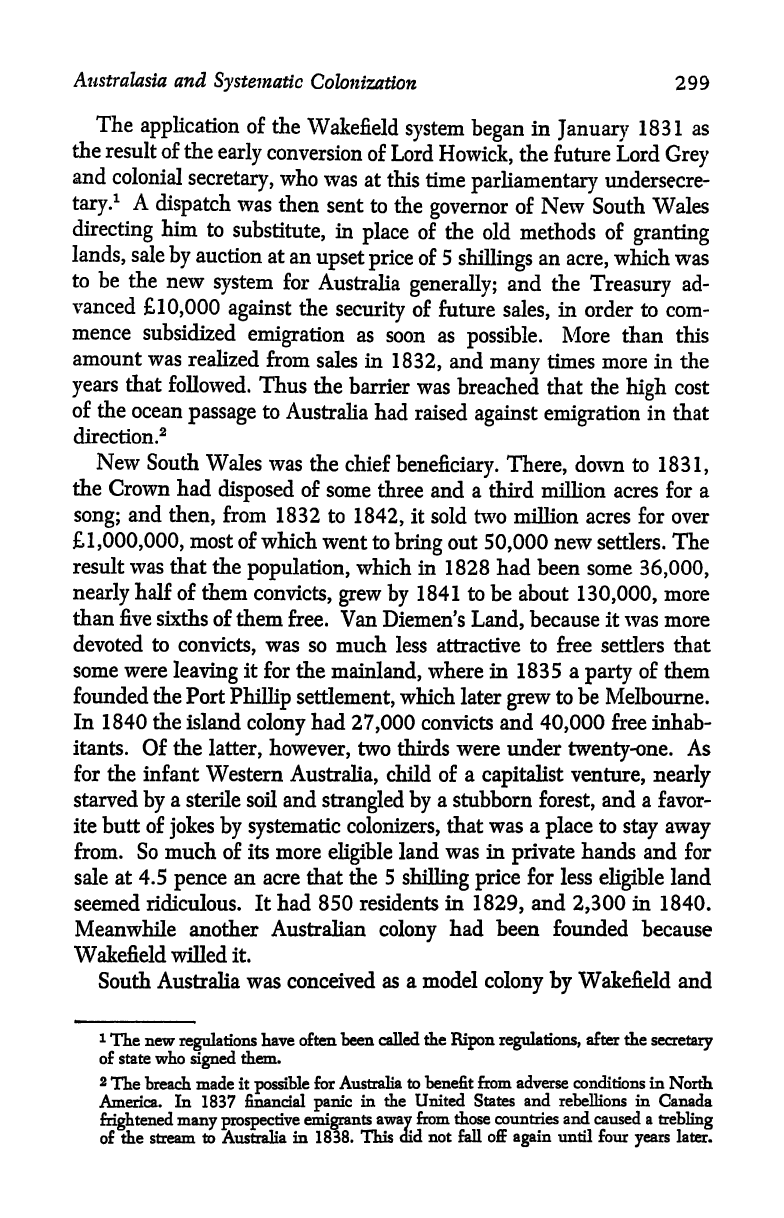
Australasia
and
Systematic
Colonization
299
The
application
of
the
Wakefield
system
began
in
January
1831
as
the
result
of
the
early
conversion
of Lord
Howick,
the future Lord
Grey
and
colonial
secretary,
who
was
at
this time
parliamentary
undersecre-
tary.
1
A
dispatch
was
then
sent
to the
governor
of New South
Wales
directing
him
to
substitute,
in
place
of the
old
methods
of
granting
lands,
sale
by
auction
at
an
upset
price
of 5
shillings
an
acre,
which was
to
be the
new
system
for
Australia
generally;
and the
Treasury
ad-
vanced
10,000
against
the
security
of
future
sales,
in order to com-
mence
subsidized
emigration
as
soon as
possible.
More than this
amount
was
realized
from
sales
in
1832,
and
many
times more in
the
years
that
followed.
Thus
the
barrier
was
breached that the
high
cost
of the
ocean
passage
to
Australia
had raised
against emigration
in that
direction.
2
New
South
Wales
was
the
chief
beneficiary.
There,
down to
1831,
the
Crown
had
disposed
of
some
three
and
a
third
million
acres for
a
song;
and
then,
from
1832
to
1842,
it
sold
two million
acres for
over
1,000,000,
most
of
which
went
to
bring
out
50,000
new
settlers.
The
result was
that the
population,
which in 1828
had been some
36,000,
nearly
half
of them
convicts,
grew by
1841 to
be about
130,000,
more
than
five
sixths of
them
free. Van
Diemen's
Land,
because
it was
more
devoted to
convicts,
was so
much
less attractive
to free
settlers
that
some were
leaving
it
for
the
mainland,
where in 1835
a
party
of them
founded
the Port
Phillip
settlement,
which later
grew
to be Melbourne.
In 1840 the
island
colony
had
27,000
convicts and
40,000
free inhab-
itants.
Of
the
latter,
however,
two thirds were under
twenty-one.
As
for the infant Western
Australia,
child of
a
capitalist
venture,
nearly
starved
by
a
sterile
soil and
strangled by
a stubborn
forest,
and
a
favor-
ite butt of
jokes by
systematic
colonizers,
that was
a
place
to
stay away
from. So much of its more
eligible
land
was
in
private
hands
and for
sale
at 4.5
pence
an acre that the 5
shilling
price
for less
eligible
land
seemed ridiculous. It had
850 residents
in
1829,
and
2,300
in
1840.
Meanwhile another
Australian
colony
had
been
founded
because
Wakefield
willed
it.
South
Australia was
conceived
as a model
colony
by
Wakefield
and
1
The
new
regulations
have
often
been
called
the
Ripon
regulations,
after
the
secretary
of state who
signed
them.
2
The breach
made it
possible
for Australia
to benefit from adverse conditions
in
North
America.
In
1837
financial
panic
in the
United
States
and
rebellions in
Canada
frightened
many prospective
emigrants
away
from those countries
and
caused a
trebling
of
the stream
to
Australia
in 1838.
This
did not fall off
again
until
four
years
later.
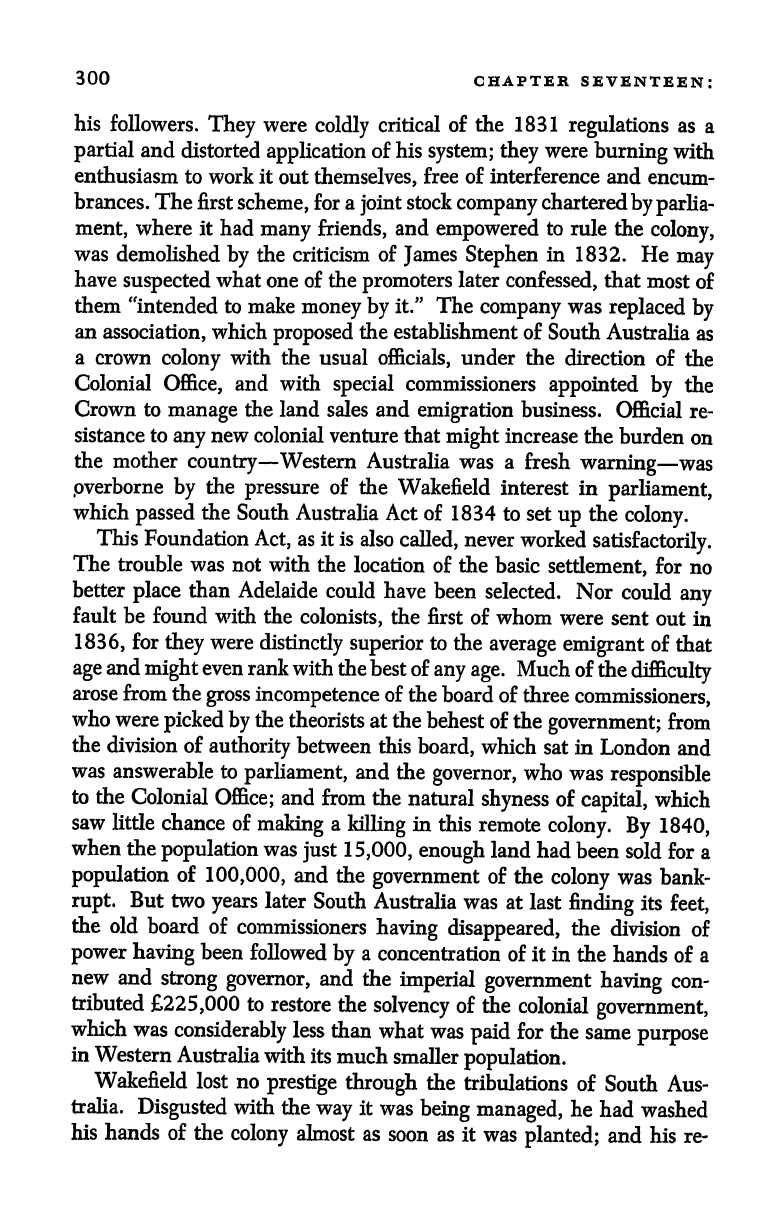
300
CHAPTER
SEVENTEEN:
his
followers.
They
were
coldly
critical
of
the 1831
regulations
as
a
partial
and
distorted
application
of
his
system; they
were
burning
with
enthusiasm
to work it
out
themselves,
free of interference
and
encum-
brances.
The
first
scheme,
for
a
joint
stock
company
chartered
by parlia-
ment,
where it
had
many
friends,
and
empowered
to
rule
the
colony,
was
demolished
by
the
criticism
of
James
Stephen
in 1832.
He
may
have
suspected
what one
of
the
promoters
later
confessed,
that
most
of
them
"intended
to make
money
by
it." The
company
was
replaced
by
an
association,
which
proposed
the
establishment of
South
Australia
as
a
crown
colony
with the
usual
officials,
under the
direction
of
the
Colonial
Office,
and
with
special
commissioners
appointed
by
the
Crown to
manage
the land
sales and
emigration
business.
Official
re-
sistance
to
any
new
colonial venture
that
might
increase the
burden
on
the mother
country
Western
Australia
was
a
fresh
warning
was
.overborne
by
the
pressure
of
the
Wakefield
interest in
parliament,
which
passed
the
South
Australia Act
of 1834
to set
up
the
colony.
This
Foundation
Act,
as it is
also
called,
never
worked
satisfactorily.
The
trouble was not
with the
location
of the
basic
settlement,
for
no
better
place
than
Adelaide
could
have
been
selected. Nor
could
any
fault
be
found with
the
colonists,
the
first
of
whom
were
sent
out
in
1836,
for
they
were
distinctly superior
to
the
average
emigrant
of
that
age
and
might
even rank
with
the
best
of
any
age.
Much
of
the
difficulty
arose from the
gross
incompetence
of
the
board of three
commissioners,
who were
picked by
the
theorists at the
behest
of the
government;
from
the
division
of
authority
between this
board,
which
sat
in
London
and
was
answerable to
parliament,
and the
governor,
who
was
responsible
to the
Colonial
Office;
and from
the
natural
shyness
of
capital,
which
saw
little
chance
of
making
a
killing
in
this
remote
colony.
By
1840,
when the
population
was
just
15,000,
enough
land
had been
sold for
a
population
of
100,000,
and
the
government
of
the
colony
was
bank-
rupt.
But two
years
later
South
Australia was
at
last
finding
its
feet,
the
old
board
of
commissioners
having
disappeared,
the
division
of
power
having
been
followed
by
a
concentration
of it
in the
hands of a
new
and
strong governor,
and
the
imperial
government
having
con-
tributed
225,000
to
restore the
solvency
of the
colonial
government,
which
was
considerably
less
than
what
was
paid
for
the
same
purpose
in
Western
Australia
with
its
much
smaller
population.
Wakefield lost no
prestige
through
the
tribulations
of
South Aus-
tralia.
Disgusted
with
the
way
it
was
being
managed,
he
had
washed
his hands of
the
colony
almost
as
soon as
it was
planted;
and his
re-
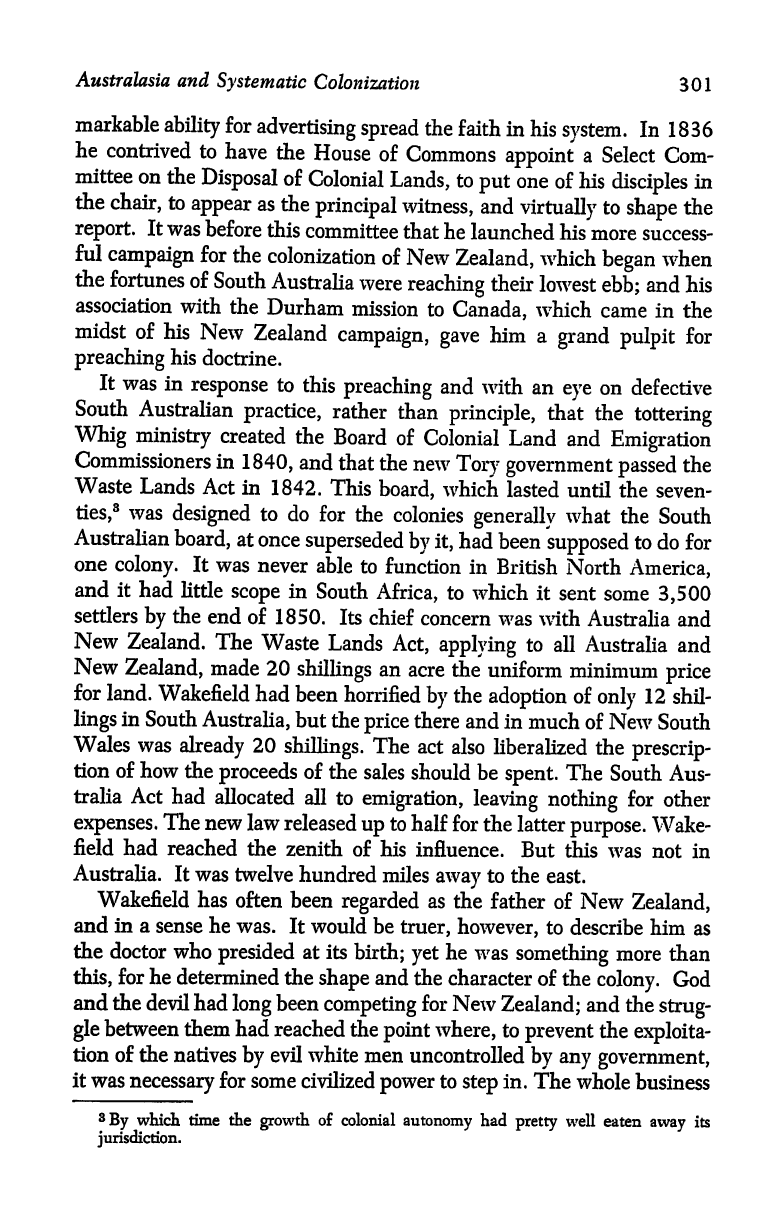
Australasia and
Systematic
Colonization
301
markable
ability
for
advertising spread
the
faith
in his
system.
In
1836
he
contrived
to
have
the
House
of
Commons
appoint
a
Select
Com-
mittee on
the
Disposal
of
Colonial
Lands,
to
put
one
of his
disciples
in
the
chair,
to
appear
as
the
principal
witness,
and
virtually
to
shape
the
report.
It
was
before
this
committee that
he
launched his
more
success-
ful
campaign
for
the
colonization
of
New
Zealand,
which
began
when
the
fortunes
of
South
Australia
were
reaching
their
lowest
ebb;
and
his
association
with
the
Durham
mission to
Canada,
which
came
in
the
midst
of
his
New
Zealand
campaign,
gave
him
a
grand pulpit
for
preaching
his
doctrine.
It
was in
response
to
this
preaching
and with an
eye
on
defective
South
Australian
practice,
rather
than
principle,
that
the
tottering
Whig
ministry
created
the
Board
of
Colonial
Land and
Emigration
Commissioners
in
1840,
and
that
the
new
Tory government
passed
the
Waste
Lands
Act
in
1842.
This
board,
which
lasted
until
the
seven-
ties,
3
was
designed
to do
for
the
colonies
generally
what
the South
Australian
board,
at once
superseded
by
it,
had
been
supposed
to
do
for
one
colony.
It
was
never
able
to
function
in
British
North
America,
and it
had
little
scope
in
South
Africa,
to which
it
sent
some
3,500
settlers
by
the
end
of
1850.
Its
chief
concern
was
with
Australia
and
New
Zealand.
The
Waste
Lands
Act,
applying
to all
Australia
and
New
Zealand,
made 20
shillings
an
acre the
uniform
minimum
price
for
land.
Wakefield
had been
horrified
by
the
adoption
of
only
12
shil-
lings
in
South
Australia,
but
the
price
there
and
in
much
of New
South
Wales
was
already
20
shillings.
The
act
also
liberalized
the
prescrip-
tion of
how the
proceeds
of
the
sales
should be
spent.
The
South
Aus-
tralia Act
had
allocated
all
to
emigration,
leaving
nothing
for
other
expenses.
The new
law
released
up
to half
for the
latter
purpose.
Wake-
field had
reached the
zenith
of
his
influence.
But
this
was not
in
Australia. It
was twelve
hundred
miles
away
to the
east.
Wakefield has often been
regarded
as
the
father
of
New
Zealand,
and
in
a
sense he
was.
It
would be
truer,
however,
to
describe
him
as
the
doctor who
presided
at its
birth;
yet
he
was
something
more
than
this,
for he
determined the
shape
and the
character
of the
colony.
God
and
the
devil
had
long
been
competing
for
New
Zealand;
and the
strug-
gle
between them
had
reached
the
point
where,
to
prevent
the
exploita-
tion of the
natives
by
evil white
men
uncontrolled
by
any
government,
it
was
necessary
for some
civilized
power
to
step
in.
The
whole
business
3
By
which time the
growth
of
colonial
autonomy
had
pretty
well
eaten
away
its
jurisdiction.
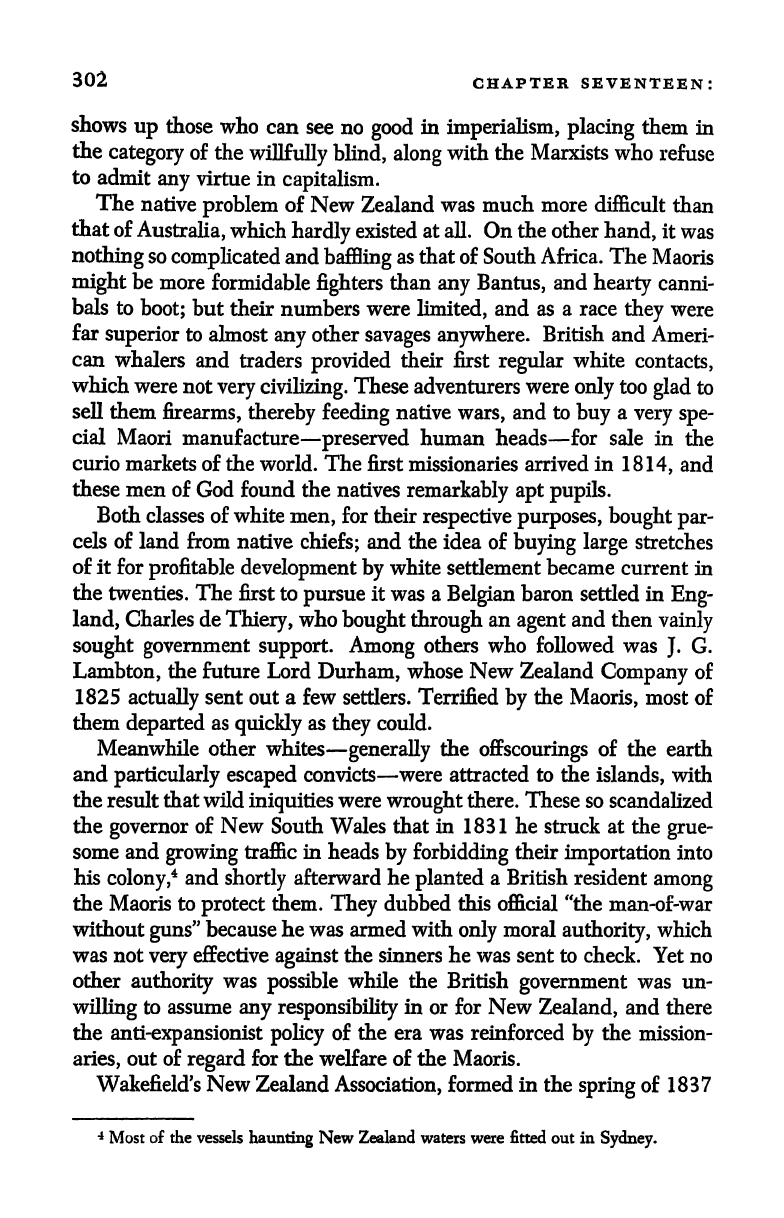
302
CHAPTER
SEVENTEEN:
shows
up
those who
can
see no
good
in
imperialism,
placing
them
in
the
category
of the
willfully
blind,
along
with the Marxists
who
refuse
to
admit
any
virtue
in
capitalism.
The
native
problem
of New Zealand
was much more
difficult
than
that
of
Australia,
which
hardly
existed
at
all. On
the
other
hand,
it
was
nothing
so
complicated
and
baffling
as that
of
South Africa.
The
Maoris
might
be
more
formidable
fighters
than
any
Bantus,
and
hearty
canni-
bals
to
boot;
but their
numbers
were
limited,
and as
a
race
they
were
far
superior
to
almost
any
other
savages anywhere.
British
and
Ameri-
can
whalers
and
traders
provided
their first
regular
white
contacts,
which
were
not
very
civilizing.
These adventurers were
only
too
glad
to
sell
them
firearms,
thereby
feeding
native
wars,
and
to
buy
a
very
spe-
cial
Maori
manufacture
preserved
human
heads for sale in
the
curio
markets
of
the
world.
The
first
missionaries
arrived
in
1814,
and
these
men of
God found the natives
remarkably apt pupils.
Both
classes
of
white
men,
for their
respective
purposes,
bought
par-
cels of
land from native
chiefs;
and
the
idea
of
buying large
stretches
of
it
for
profitable
development
by
white settlement
became
current
in
the
twenties. The
first to
pursue
it
was a
Belgian
baron
settled in
Eng-
land,
Charles de
Thiery,
who
bought through
an
agent
and then
vainly
sought
government
support.
Among
others who
followed was
J.
G.
Lambton,
the future Lord
Durham,
whose New
Zealand
Company
of
1825
actually
sent out
a
few
settlers. Terrified
by
the
Maoris,
most
of
them
departed
as
quickly
as
they
could.
Meanwhile
other whites
generally
the
offscourings
of the earth
and
particularly
escaped
convicts were attracted to the
islands,
with
the
result
that
wild
iniquities
were
wrought
there. These so scandalized
the
governor
of New
South Wales
that in 1831 he struck at
the
grue-
some and
growing
traffic
in
heads
by
forbidding
their
importation
into
his
colony,
4
and
shortly
afterward he
planted
a British
resident
among
the Maoris to
protect
them.
They
dubbed this
official "the man-of-war
without
guns"
because
he
was
armed
with
only
moral
authority,
which
was not
very
effective
against
the sinners he was sent
to
check. Yet no
other
authority
was
possible
while the British
government
was un-
willing
to
assume
any
responsibility
in or for New
Zealand,
and there
the
anti-expansionist policy
of
the era
was reinforced
by
the mission-
aries,
out
of
regard
for the
welfare
of
the Maoris.
Wakefield's
New
Zealand
Association,
formed
in
the
spring
of 1837
4
Most
of the
vessels
haunting
New
Zealand
waters were
fitted
out
in
Sydney.
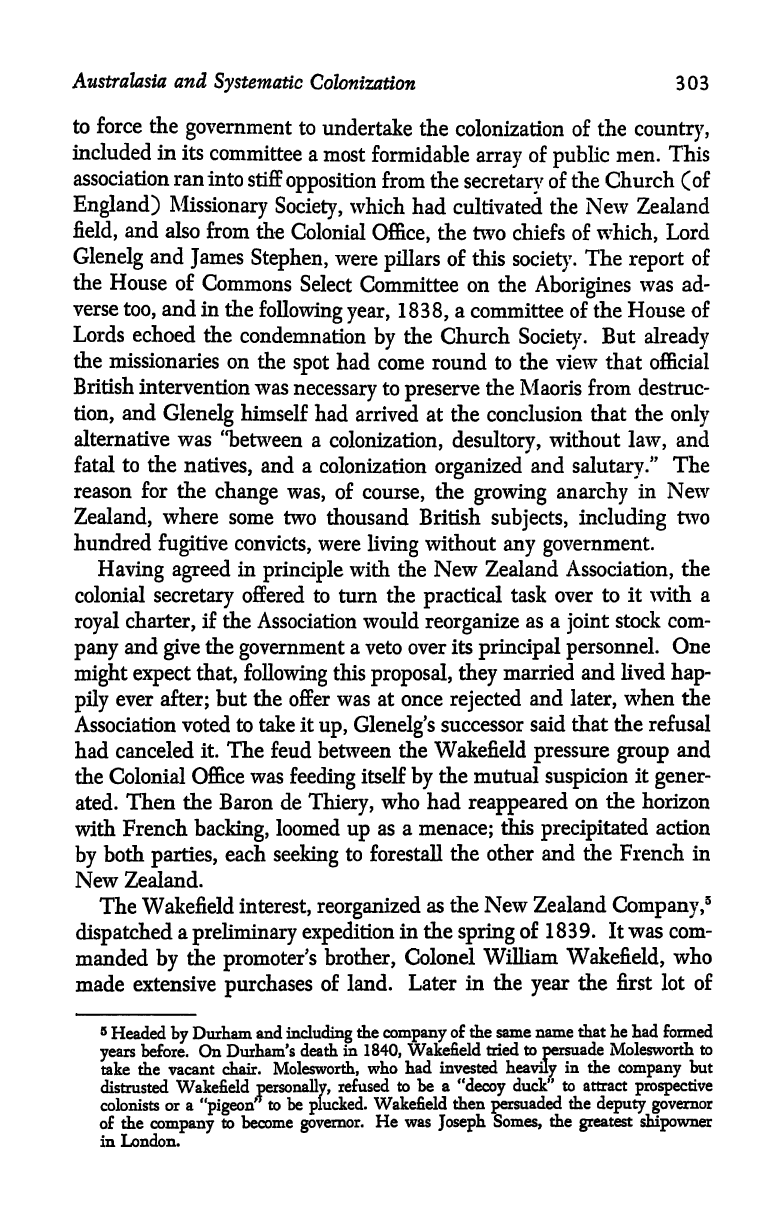
Australasia
and
Systematic
Colonization
303
to
force the
government
to
undertake the
colonization of
the
country,
included in its
committee
a
most
formidable
array
of
public
men.
This
association
ran
into
stiff
opposition
from
the
secretary
of
the
Church
(of
England)
Missionary
Society,
which
had
cultivated the New
Zealand
field,
and
also
from
the
Colonial
Office,
the two chiefs of
which,
Lord
Glenelg
and
James
Stephen,
were
pillars
of
this
society.
The
report
of
the
House
of
Commons
Select Committee
on the
Aborigines
was ad-
verse
too,
and in
the
following
year,
1838,
a
committee of the
House
of
Lords
echoed the
condemnation
by
the
Church
Society.
But
already
the
missionaries
on
the
spot
had
come round
to the view that
official
British
intervention was
necessary
to
preserve
the Maoris
from
destruc-
tion,
and
Glenelg
himself
had
arrived
at the conclusion
that the
only
alternative was
"between a
colonization,
desultory,
without
law,
and
fatal
to
the
natives,
and
a
colonization
organized
and
salutary."
The
reason
for
the
change
was,
of
course,
the
growing
anarchy
in
New
Zealand,
where
some
two
thousand
British
subjects,
including
two
hundred
fugitive
convicts,
were
living
without
any
government.
Having agreed
in
principle
with the
New Zealand
Association,
the
colonial
secretary
offered
to turn
the
practical
task
over to
it with a
royal
charter,
if the Association
would
reorganize
as
a
joint
stock
com-
pany
and
give
the
government
a
veto over
its
principal personnel.
One
might
expect
that,
following
this
proposal,
they
married and
lived
hap-
pily
ever
after;
but the
offer
was at once
rejected
and
later,
when the
Association voted to take
it
up, Glenelg's
successor
said
that the
refusal
had canceled
it.
The
feud between
the Wakefield
pressure
group
and
the Colonial Office
was
feeding
itself
by
the mutual
suspicion
it
gener-
ated.
Then
the
Baron
de
Thiery,
who had
reappeared
on
the
horizon
with
French
backing,
loomed
up
as a
menace;
this
precipitated
action
by
both
parties,
each
seeking
to forestall
the other and
the French
in
New
Zealand.
The Wakefield
interest,
reorganized
as
the New Zealand
Company,
5
dispatched
a
preliminary
expedition
in the
spring
of 1839.
It
was com-
manded
by
tie
promoter's
brother,
Colonel
William
Wakefield,
who
made
extensive
purchases
of land.
Later in the
year
the first lot
of
5
Headed
by
Durham
and
including
the
company
of the same
name that
he
had formed
years
before. On
Durham's
death in
1840,
Wakefield
tried to
persuade
Molesworth
to
take the vacant
chair.
Molesworth,
who had invested
heavily
in
the
company
but
distrusted
Wakefield
personally,
refused
to be
a
"decoy
duck"
to attract
prospective
colonists
or
a
"pigeon
to
be
plucked.
Wakefield
then
persuaded
the
deputy governor
of
the
company
to
become
governor.
He was
Joseph
Somes,
the
greatest
shipowner
in London.
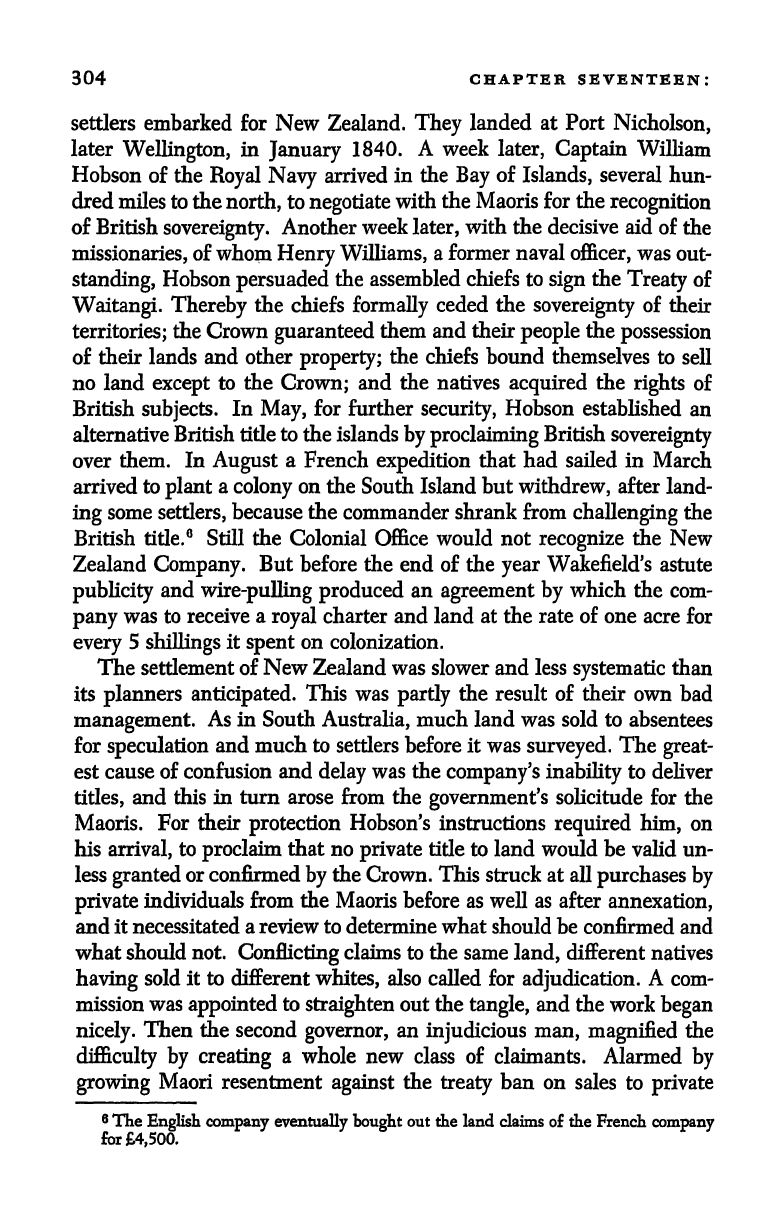
304
CHAPTER
SEVENTEEN:
settlers
embarked for
New
Zealand.
They
landed
at Port
Nicholson,
later
Wellington,
in
January
1840.
A week
later,
Captain
William
Hobson
of
the
Royal Navy
arrived
in the
Bay
of
Islands,
several
hun-
dred
miles
to the
north,
to
negotiate
with the Maoris
for
the
recognition
of
British
sovereignty.
Another
week
later,
with
the decisive aid
of
the
missionaries,
of
whom
Henry
Williams,
a former naval
officer,
was
out-
standing,
Hobson
persuaded
the
assembled chiefs
to
sign
the
Treaty
of
Waitangi.
Thereby
the chiefs
formally
ceded
the
sovereignty
of
their
territories;
the
Crown
guaranteed
them
and
their
people
the
possession
of
their lands
and other
property;
the
chiefs bound themselves
to
sell
no
land
except
to
the
Crown;
and
the natives
acquired
the
rights
of
British
subjects.
In
May,
for further
security,
Hobson
established
an
alternative
British title
to
the islands
by proclaiming
British
sovereignty
over
them.
In
August
a
French
expedition
that had sailed
in
March
arrived
to
plant
a
colony
on the
South Island but
withdrew,
after
land-
ing
some
settlers,
because
the commander
shrank
from
challenging
the
British title.
6
Still
the
Colonial Office would
not
recognize
the
New
Zealand
Company.
But
before the end of the
year
Wakefield's astute
publicity
and
wire-pulling
produced
an
agreement
by
which
the
com-
pany
was to
receive
a
royal
charter and land
at the
rate
of one acre
for
every
5
shillings
it
spent
on
colonization.
The settlement
of
New
Zealand was slower and less
systematic
than
its
planners anticipated.
This was
partly
the result of their
own
bad
management.
As in South
Australia,
much
land
was
sold
to
absentees
for
speculation
and
much to
settlers before it
was
surveyed.
The
great-
est
cause
of confusion
and
delay
was the
company's inability
to deliver
titles,
and
this
in turn
arose from the
government's
solicitude for
the
Maoris.
For their
protection
Hobson's instructions
required
him,
on
his
arrival,
to
proclaim
that
no
private
title to land would be
valid
un-
less
granted
or confirmed
by
the
Crown. This struck at all
purchases by
private
individuals
from the Maoris
before as well
as
after
annexation,
and it
necessitated a review to determine
what
should be
confirmed and
what should
not.
Conflicting
claims to
the
same
land,
different
natives
having
sold
it
to
different
whites,
also
called
for
adjudication.
A
com-
mission
was
appointed
to
straighten
out the
tangle,
and
the
work
began
nicely.
Then the second
governor,
an
injudicious
man,
magnified
the
difficulty by
creating
a
whole new
class
of
claimants.
Alarmed
by
growing
Maori resentment
against
the
treaty
ban
on
sales
to
private
6
Hie
English
company
eventually
bought
out the land claims
of the French
company
for4,500.
